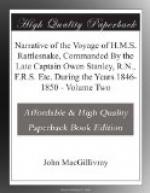We pitched our tents about two hundred yards from the beach, forming a square, with the sheepfold in the centre. Mr. Kennedy came on shore in the morning to superintend the arrangements, and after giving the necessary directions and instructions, returned to the ship. The party left ashore in charge consisted of myself, Wall, Dunn, Carpenter, and Douglas. Our provisions were supplied from the ship, in order that no time might be lost in getting all our stores and implements in proper order for starting.
A few yards from our camp was a freshwater creek, from which, although the tide ran into it about one hundred yards—where it was stopped by a small bank—we could obtain excellent water. The grass around was very long, and mostly of very coarse descriptions, consisting chiefly of a species of Uniola growing in tufts, and an Agrostis with creeping roots and broad blades; the horses seemed to like the Uniola best. A little to the northward of our camp were very high and almost perpendicular rocks, composed mostly of micaceous schist, covered with various epiphytal orchides and ferns.
The labour of the day being ended, and most of our stores landed, the greater number of our party came ashore to pass the night; and after having tethered the horses in fresh places, we assembled at supper, the materiel of which (beef and biscuit) was sent from the ship. We then took possession of our tents, one square tent being allotted to Mr. Kennedy; Niblet, Wall, and myself occupied a small round one; Taylor, Douglas, Carpenter, Mitchell, and Jackey, a large round tent; and Luff, Dunn, Goddard, and Costigan, the other.
Mr. Kennedy’s tent was 8 feet long, by 6 feet, and 8 feet high, and in it were placed a compact table, constructed with joints so as to fold up, a light camp stool, his books and instruments. The two larger round tents were pyramidal in shape, seven feet in diameter at the least, and nine feet high. The small tent was six feet in diameter, and eight feet high.
Every man was then supplied with one pair of blankets, one cloak, a double-barrelled gun or carbine, a brace of pistols, cartridge box, small percussion-cap pouch, and six rounds of ammunition. The arrangement for preserving the safety of the camp from attack was, that every man, with the exception of Mr. Kennedy, should take his turn to watch through the night—two hours being the duration of each man’s watch—the watch extending from 8 P.M. till 6 A.M. During the night the kangaroo-dogs were kept chained up, but the sheepdog was at large.
The position of this our first encampment was near the northern extremity of Rockingham Bay, being in latitude 17 degrees 58 minutes 10 seconds south, longitude 146 degrees 8 minutes east. The soil, where our cattle and sheep were feeding, was sandy and very wet. The land, from the beach to the scrub in the swamp beyond, was slightly undulating, and very thickly strewed with shells, principally bivalves.




